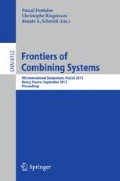Abstract
We present a method to compute uniform interpolants with fixpoints for ontologies specified in the description logic \(\mathcal{ALC}\). The aim of uniform interpolation is to reformulate an ontology such that it only uses a specified set of symbols, while preserving consequences that involve these symbols. It is known that in \(\mathcal{ALC}\) uniform interpolants cannot always be finitely represented. Our method computes uniform interpolants for the target language \(\mathcal{ALC}\mu\), which is \(\mathcal{ALC}\) enriched with fixpoint operators, and always computes a finite representation. If the result does not involve fixpoint operators, it is the uniform interpolant in \(\mathcal{ALC}\). The method focuses on eliminating concept symbols and combines resolution-based reasoning with an approach known from the area of second-order quantifier elimination to introduce fixpoint operators when needed. If fixpoint operators are not desired, it is possible to approximate the interpolant.
Access this chapter
Tax calculation will be finalised at checkout
Purchases are for personal use only
Preview
Unable to display preview. Download preview PDF.
References
Ackermann, W.: Untersuchungen über das Eliminationsproblem der mathematischen Logik. Mathematische Annalen 110(1), 390–413 (1935)
Bachmair, L., Ganzinger, H.: Resolution theorem proving. In: Handbook of Automated Reasoning, pp. 19–99. Elsevier, MIT Press (2001)
Calvanese, D., Giacomo, G.D., Lenzerini, M.: Reasoning in expressive description logics with fixpoints based on automata on infinite trees. In: Proc. IJCAI 1999, pp. 84–89. Morgan Kaufmann (1999)
D’Agonstino, G., Hollenberg, M.: Uniform interpolation, automata and the modal μ-calculus. In: AiML, vol. 1, pp. 73–84. CSLI Pub. (1998)
D’Agostino, G., Lenzi, G.: On modal μ-calculus with explicit interpolants. J. Applied Logic 4(3), 256–278 (2006)
Gabbay, D., Ohlbach, H.J.: Quantifier elimination in second-order predicate logic. In: Proc. KR 1992, pp. 425–435. Morgan Kaufmann (1992)
Gabbay, D.M., Schmidt, R.A., Szałas, A.: Second Order Quantifier Elimination: Foundations, Computational Aspects and Applications. College Publ. (2008)
Goranko, V., Hustadt, U., Schmidt, R.A., Vakarelov, D.: SCAN is complete for all Sahlqvist formulae. In: Berghammer, R., Möller, B., Struth, G. (eds.) RelMiCS 2003. LNCS, vol. 3051, pp. 149–162. Springer, Heidelberg (2004)
Grau, B.C., Motik, B.: Reasoning over ontologies with hidden content: The import-by-query approach. J. Artificial Intelligence Research 45, 197–255 (2012)
Herzig, A., Mengin, J.: Uniform interpolation by resolution in modal logic. In: Hölldobler, S., Lutz, C., Wansing, H. (eds.) JELIA 2008. LNCS (LNAI), vol. 5293, pp. 219–231. Springer, Heidelberg (2008)
Lutz, C., Piro, R., Wolter, F.: \(\mathcal{EL}\)-concepts go second-order: Greatest fixpoints and simulation quantifiers. In: Proc. DL 2010, pp. 43–54. CEUR-WS.org (2010)
Lutz, C., Wolter, F.: Foundations for uniform interpolation and forgetting in expressive description logics. In: Proc. IJCAI 2011, pp. 989–995. AAAI Press (2011)
Nikitina, N.: Forgetting in General EL Terminologies. In: Description Logics. Proc. DL 2011. CEUR-WS.org (2011)
Nonnengart, A., Szałas, A.: A fixpoint approach to second-order quantifier elimination with applications to correspondence theory. In: Logic at Work, pp. 307–328. Springer (1999)
Schmidt, R.A.: The Ackermann approach for modal logic, correspondence theory and second-order reduction. J. Appl. Logic 10(1), 52–74 (2012)
Simancik, F., Kazakov, Y., Horrocks, I.: Consequence-based reasoning beyond Horn ontologies. In: Proc. IJCAI 2011, pp. 1093–1098. AAAI Press (2011)
Szałas, A.: Second-order reasoning in description logics. J. Appl. Non-Classical Logics 16(3-4), 517–530 (2006)
Wang, Z., Wang, K., Topor, R., Zhang, X.: Tableau-based forgetting in \(\mathcal{ALC}\) ontologies. In: Proc. ECAI 2010, pp. 47–52. IOS Press (2010)
Author information
Authors and Affiliations
Editor information
Editors and Affiliations
Rights and permissions
Copyright information
© 2013 Springer-Verlag Berlin Heidelberg
About this paper
Cite this paper
Koopmann, P., Schmidt, R.A. (2013). Uniform Interpolation of \(\mathcal{ALC}\)-Ontologies Using Fixpoints. In: Fontaine, P., Ringeissen, C., Schmidt, R.A. (eds) Frontiers of Combining Systems. FroCoS 2013. Lecture Notes in Computer Science(), vol 8152. Springer, Berlin, Heidelberg. https://doi.org/10.1007/978-3-642-40885-4_7
Download citation
DOI: https://doi.org/10.1007/978-3-642-40885-4_7
Publisher Name: Springer, Berlin, Heidelberg
Print ISBN: 978-3-642-40884-7
Online ISBN: 978-3-642-40885-4
eBook Packages: Computer ScienceComputer Science (R0)

